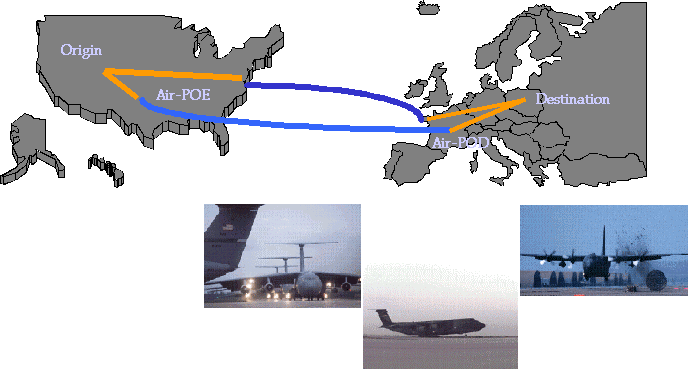
Problem |
|
Efficient allocation of aircraft and crews to transportation missions is an
important priority at the Air Mobility Command (AMC), where airlift demand
must increasingly be met with less capacity and at lower cost. Due to overall
problem scale and the time pressure of decision-making, the AMC "Barrel
Masters" responsible for making allocation decisions routinely miss
opportunities to optimize resource usage.
|
Status |
| Using the OZONE scheduling framework, we have developed a mixed-initiative scheduling tool for generating and evaluating such optimization opportunities. Experimental results with this "Barrel Allocator" tool using actual historical data have indicated the potential for substantial reduction in non-productive flying time, through better optimization of wing assignments, selective combination of missions to efficiently "recycle" aircraft, and more effective integration of tanker and airlift missions. Following positive review by AMC personnel, a version of Barrel Allocator has been installed in the Tanker Airlift Command Center (TACC) at AMC for extended user review and testing. Current plans call for Barrel Allocator to go into operational use within the TACC in August, 1999 as part of release 2.0 of AMCıs new Consolidated Air Mobility Planning System (CAMPS). |
Background |
| Barrel Allocator has been developed as part of the Advanced Automated Scheduling (AAS) component of the CAMPS development effort, which is aimed specifically at applying and transitioning new scheduling technologies developed within the DARPA/RL Planning Initiative. The Barrel Allocator relies on incremental, constraint-based scheduling techniques. This allows selective re-optimization of allocation decisions to accommodate new, higher priority missions while minimizing disruption to most previous assignments. Mission scheduling and resource allocation capabilities can be invoked in automated or semi-automated modes. In the latter case, the system generates and compares different options that might be taken. Planners interact with Barrel Allocator through graphical displays, which incorporate mission-oriented, resource-resource and map-based views of the current set of commitments. |
Recent Publications |
More Information |
| Researchers |
| Collaborators |